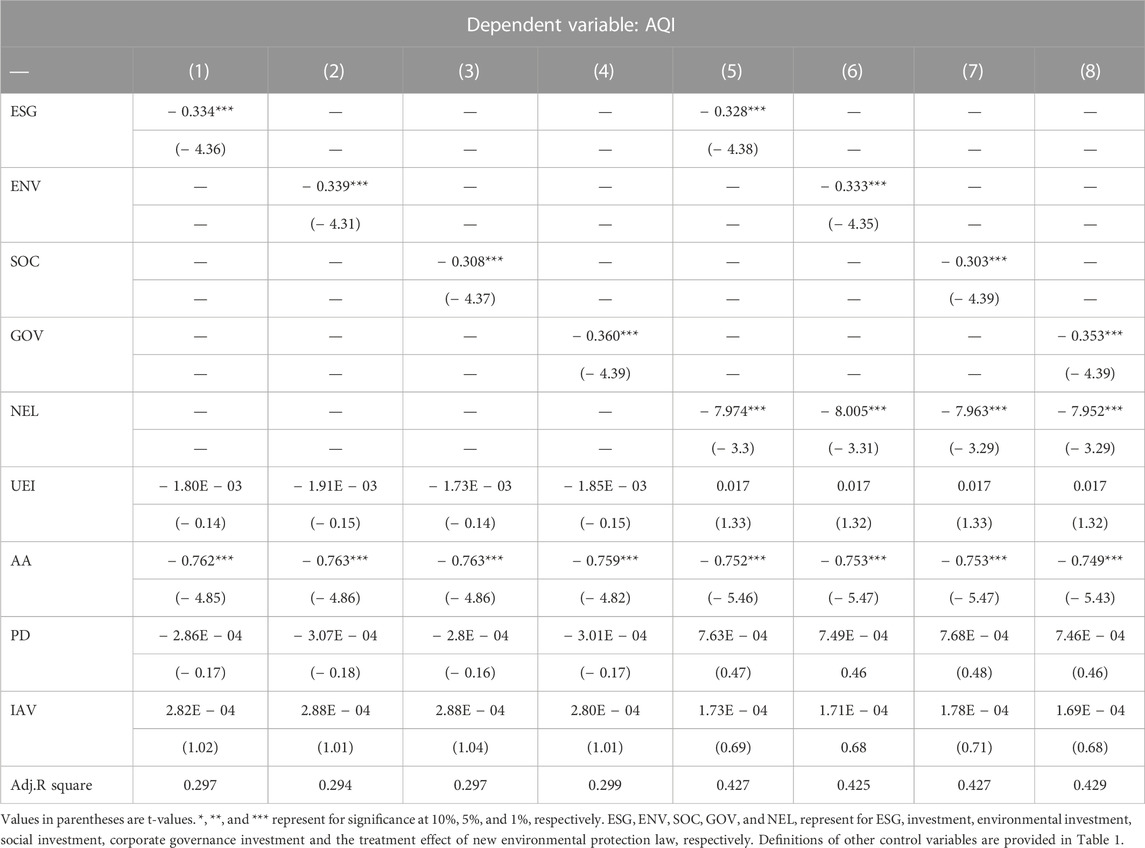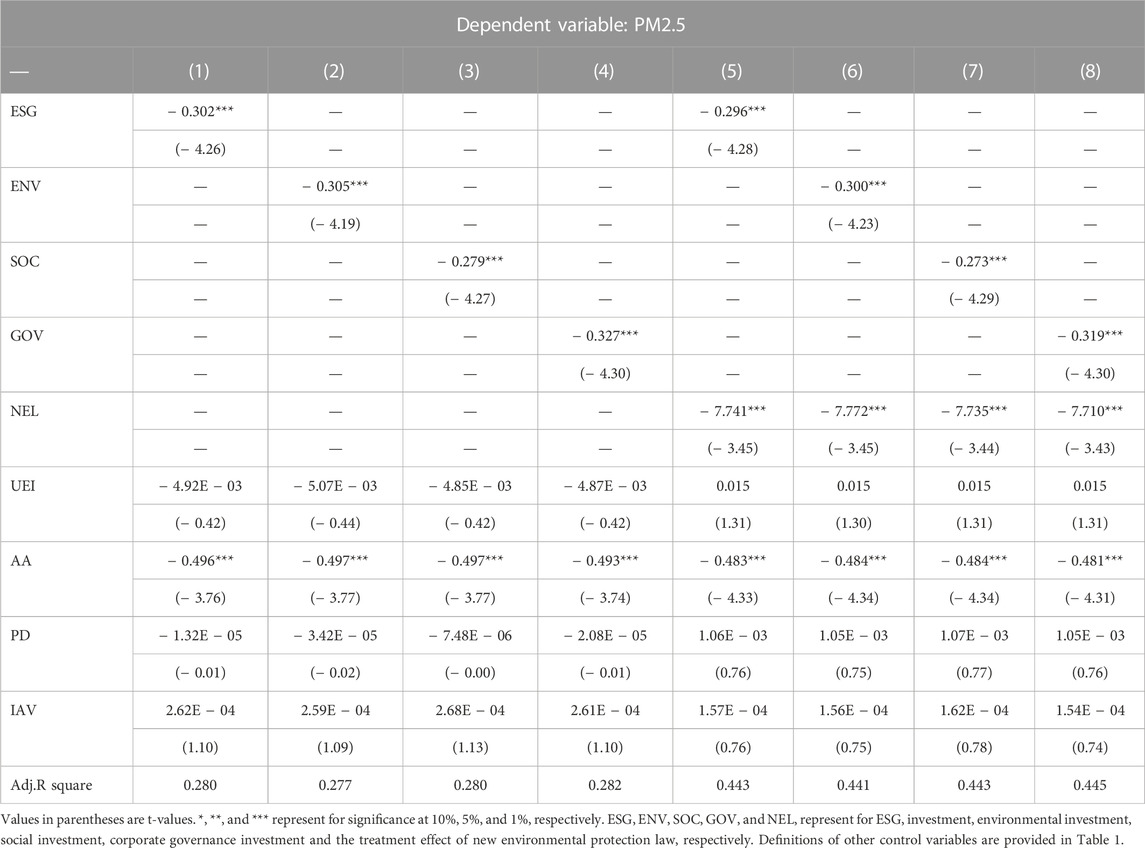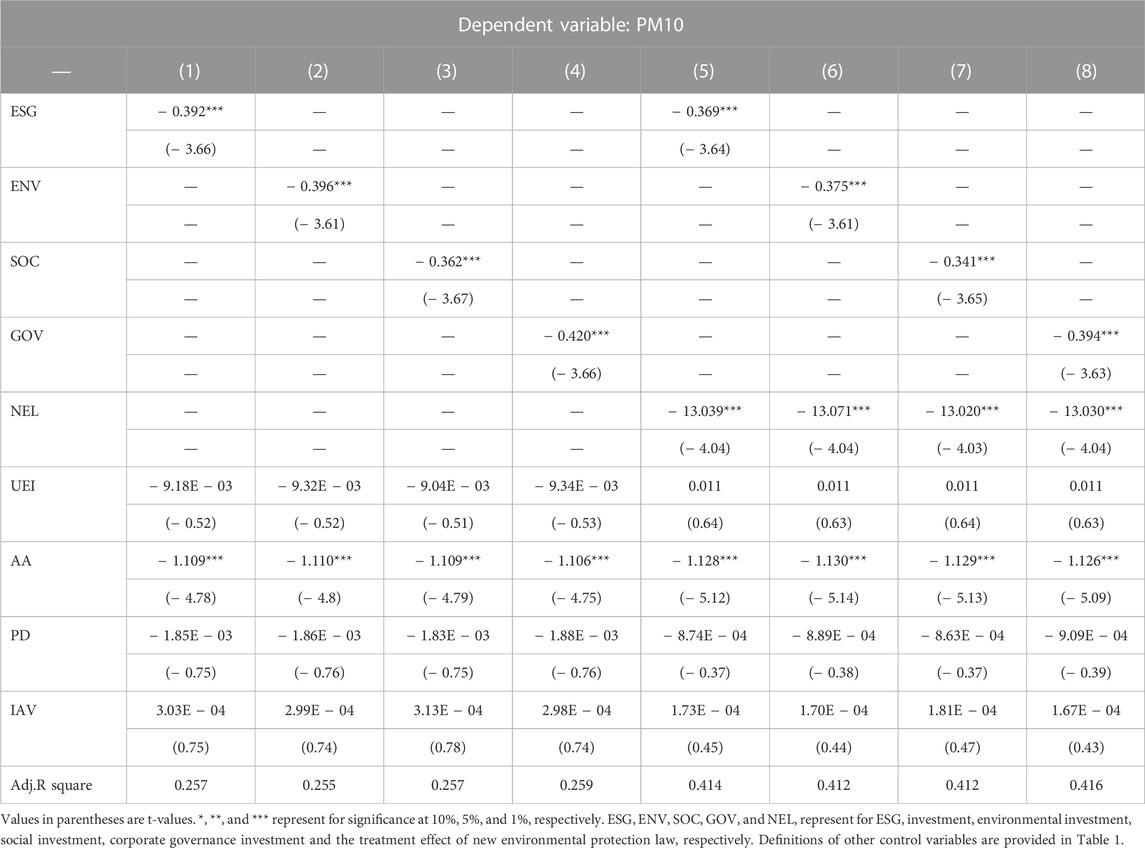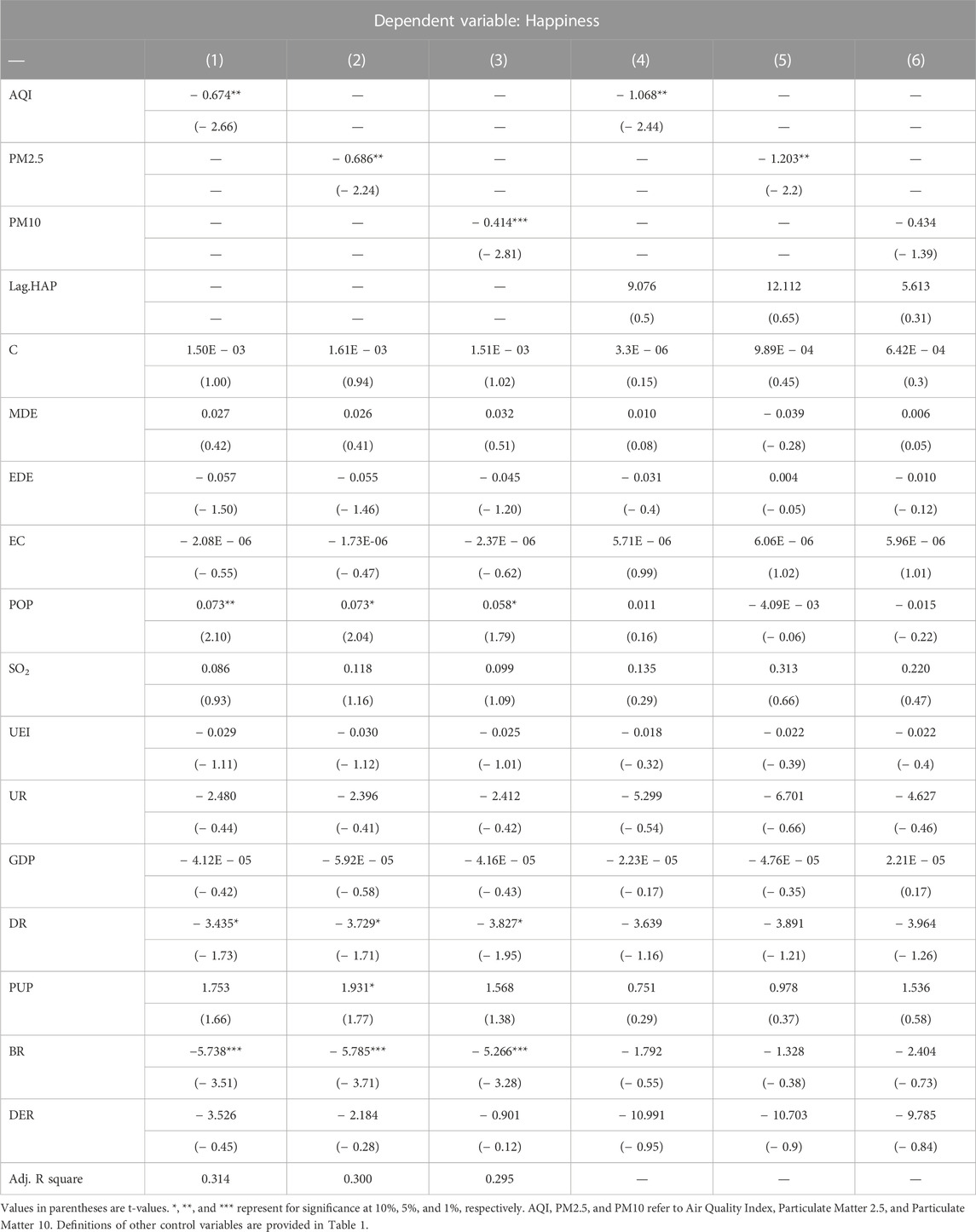- 1Graduate School of Economics, Kobe University, Kobe, Japan
- 2Research Center of Finance, Shanghai Business School, Shanghai, China
Air pollution was a serious issue in China in the early 2010s, threatening public health and sustainable economic development. The Chinese government established a new environmental protection law in 2015 in order to address air pollution and other environmental issues. This paper investigates the impact of the new environmental law and ESG investments on air pollution and social happiness. We discovered that the implementation of the new environmental law and ESG investments significantly improved social happiness by reducing air pollution. One unit increase in ESG investments would result in a 0.334 unit decrease in air pollution and 0.225 unit increase in social happiness.
1 Introduction
With the rapid development of the economy, productivity has increased significantly, while environmental pollution has increased, resulting in a slew of environmental issues that have serious implications for public health and the sustainable development of society. Environmental protection was first introduced as a clear scientific concept in 1972 at the United Nations Conference on the Human Environment. Since then, countries all over the world have gradually improved their environmental laws. According to the Declaration on the Human Environment, “peace, development, and environmental protection are interdependent and inseparable.” The primary goals of environmental management include promoting sustainable development and ensuring the happiness of citizens.
The relationship between happiness and the environment has received increased research attention in recent years (Krekel and MacKerron, 2020; Maddison et al., 2020; Bonasia et al., 2022). Traditional economic indicators of wellbeing are poor predictors of happiness. Welfare policies that place a greater emphasis on happiness can help to achieve the goals of environmental and social sustainability (Gowdy, 2005). Air pollution is a major environmental issue in many countries. Menz (2011) examined data sets from 48 countries from 1990 to 2006 and discovered that people are not accustomed to particulate pollution. Even previous pollution levels can reduce current utility. Solving environmental issues and maintaining ecological balance are critical to people’s happiness. Welsch (2006) investigates the relationship between air quality and happiness using panel data on self-reported happiness from ten European countries. He discovered that air pollution is a statistically significant predictor of inter-country and inter-temporal differences in subjective happiness, and that the effect of air pollution on happiness translates into a significant monetary value of improved air quality. These concerns about environmental quality and its impact on people’s welfare are fundamental arguments for most countries’ adoption of environmental legislation. Air quality is linked to subjective happiness in Europe, with sulfur dioxide concentrations having a significant negative impact on self-reported life satisfaction (Ferreira et al., 2013). In the United States, air pollution has a direct impact on people’s happiness, as well as any measured effects through health, lost work days, and other observable outcomes (Levinson, 2012). Breslow et al. (2016) developed an integrated framework about environmental conditions and management actions in response to growing interest in assessing the impact of changing environmental conditions and management actions on happiness. They contend that happiness cannot be a secondary goal of environmental policy. The possible link between environmental policy and happiness is something that needs to be looked into further. Public support for environmental protection is a reaction to the decline in quality of life caused by overexploitation of natural resources, and it seeks to restore happiness by improving environmental quality and ensuring a healthy ecosystem. Thus, public support serves to provide environmental protection and pollution reduction, which can be considered wellbeing attributes because they influence individuals’ and communities’ ability to achieve healthy environmental goals. Empirically, Bonasia et al. (2022) examine micro and macro data from 19 European countries from 1997 to 2019 and discover a direct link between happiness and long-term environmental protection spending in European countries. They advocate for governments to include environmental spending as a means of increasing domestic happiness, emphasizing the importance of the interaction between environmental quality and life satisfaction.
Environmental pollution in developing countries has become a global issue since the twenty-first century. Air pollution has caused serious health problems in China and India since 2010. According to the World Health Organization (2016), China and India had the highest number of air pollution-related deaths in 2012. Environmental pollution’s threats to life and health severely reduce people’s happiness (Huhtala and Samakovlis, 2007; Almetwally et al., 2020). Air pollution can have an impact on both physical and psychological health. Shi and Yu (2020) use the number of environmental regulations at the prefecture level to assess the welfare loss caused by air pollution. Their findings suggest a link between air pollution and individual happiness. The impact of PM2.5 emissions on happiness is more closely related to physical health than mental health. According to some studies, pollution can cause significant decreases in happiness (Chen et al., 2013; Ebenstein et al., 2017). Environmental regulations are classified into three types, according to Guo et al. (2020). (i.e., economic environmental regulation, legal environmental regulation, and supervised environmental regulation). They conducted an econometric analysis on the relationship between environmental regulations and happiness, and examined the time-lag effect of policy implementation, using micro data from the Chinese Social Census and macro data from 28 Chinese provinces and cities from 2013 to 2015. They demonstrate that long-term economic and environmental regulation can significantly improve happiness. The Chinese government has enacted environmental regulations that require cities to report their daily air quality data. This mandatory disclosure of air quality information regulation has had a significant positive impact on individual happiness, primarily by lowering air pollution (Wang et al., 2021). According to Tian et al. (2016), environmental information disclosure is effective in pollution control. In China, public information requests may be the most effective method of pollution control. According to Xu et al. (2022), all three types of environmental regulations (command-and-control, market-based, and voluntary) can reduce the negative effects of air pollution on residents’ happiness, but the overall mitigation effect is non-linear. In terms of welfare, air pollution is costly to society and individuals. Some studies examine the effects of environmental pollution on social welfare (Smyth et al., 2008; Smyth et al., 2011; Li and Zhou, 2020; Wang et al., 2020; Yang et al., 2020), whereas the effects of environmental policies on social welfare require further investigation.
In the early 2010s, China’s air pollution reached crisis proportions. To protect public health, the Chinese government proposed the Action Plan for Air Pollution Prevention and Control (APAPCC) in 2013 and reformed environmental protection legislation. The new environmental protection law was approved on 24 April 2014, and went into effect in early 2015. Since the old law was passed in 1989, this was the first time the Chinese government amended the law to address the new era’s environmental pollution problem. The new law emphasizes “public participation” and “liability for damage” (Liu et al., 2021.). It makes significant changes in the following areas. First, environmental protection and public welfare organizations can file environmental public interest litigation against polluting enterprises that commit illegal and environmentally destructive acts. Second, it increases government and official accountability and power. The new law states unequivocally that the government is responsible for environmental quality within its administrative jurisdiction. The ecological protection red line is an important standard for assessing government officials’ environmental protection responsibilities during their tenure. Local environmental agencies have the authority to halt illegal environmental activities. Furthermore, it significantly increases polluters’ responsibility. High-polluting businesses must provide more specific environmental information to the public, such as the name of pollutants discharged, emission method, emission concentration and emission level, total emissions of major pollutants and excessive emissions, and details on the construction and operation of pollution prevention facilities. Furthermore, the law establishes a daily penalty system, which means that businesses involved in pollution cases will be fined indefinitely until they correct illegal pollutant discharge behavior.
Recently, ESG investment has been widely recognized as an effective means of protecting the environment and ensuring the economy’s long-term development, attracting significant research attention. According to Li and Li (2022), an environmental protection tax implemented in China in 2018 significantly improved ESG investments by Chinese listed companies and promoted green technological innovations. They also established a link between ESG performance and green innovation. Zheng et al. (2022) discover a long-run bidirectional comovement between ESG performance and enterprise green innovation output. According to Bada et al. (2019), high-rated government bonds outperform low-rated bonds across all ESG dimensions. Zhou and Zhou (2021) showed that good ESG performance reduced the increase in stock price volatility caused by COVID-19, and played a role in improving “resilience” and stabilizing stock prices. Since the emission of air pollutants by polluting industries is considered the major source of air pollution in China, ESG investments strength should be closely related to air pollution.
This paper examines how ESG investments and China’s new environmental law affect social happiness. We collect the most recent environmental, macroeconomic, ESG investment, and social survey data and analyze the impact of ESG investments and new environmental legislation on social happiness. We contribute to the literatures as follows. First, while the impact of ESG investment on social welfare would be of great research interest, such issues have not been adequately studied. We fill this void by emphasizing the importance of ESG investment’s social impact. Second, literature on happiness focuses primarily on the individual level. We approach our analysis in this paper from a macro perspective. As a result, our findings are critical for policymakers.
According to our findings, China’s air pollution has significantly reduced social happiness. ESG investments and the new environmental law significantly reduced air pollution, restoring severely damaged social happiness in the years that followed.
The remainder of the paper is organized as follows. Section 2 briefly describes our data. Our models are introduced in Section 3. Section 4 discusses the empirical findings, and Section 5 concludes.
2 Data
We focus on the impact of air pollution, ESG investment, and new environmental law on social happiness in this paper. Our sample spans the years 2015–2019. We obtain the most recent personal happiness score from the Chinese General Social Survey (CGSS), the China Family Panel Studies (CFPS), and the Chinese Social Survey (CSS). We use all of these data to build our social happiness data because these social surveys were not conducted every year. Specifically, we use CGSS 2015, 2017, and 2018, CFPS 2016, and CSS 2019. Then, each year, we calculate the provincial happiness score as the average of personal happiness in each province. We unified the scale of these data because the CFPS’s scale of happiness score (which ranges from one to ten) differs from the CGSS’s and CSS’s (which range from one to five).
Our ESG data, which includes environmental, social and corporate governance investment scores on China’s listed companies, is provided by Syntao Green Finance in China. These scores are rated according to 14 categories and over 200 indicators. The aggregate ESG investment strength is a better indicator of local environmental protection efforts than the average ESG investment level of listed businesses, thus we calculate the ESG and environmental investment scores at the provincial level by adding up these scores in each province.
We obtain information on the air quality index (AQI), PM2.5, and PM10 from the China Air Quality Online Detection and Analysis Platform in terms of air pollution. The average of the cities within each province is used to calculate the air quality data at the provincial level.
Other control variables are gathered from the National Bureau of Statistics of China and include industrial added value, population density, afforestation area, coal consumption, government medical and educational spending, unemployment rate, GDP per capita, divorce rate, proportion of urban population, birth rate, and death rate, among others. Table 1 lists the definitions of the variables and the summary statistics.
3 Models
First, we construct the following panel regression model to investigate the impact of air pollution on social happiness.
where
Then, we construct the following Difference-in-Difference models to examine the influence of ESG investment and the implementation of new environmental law on air pollution.
where
4 Empirical results
In this part, we first investigate whether, from a global perspective, air pollution has an impact on social happiness. The impact of ESG investments and the enforcement of new environmental protection laws on air pollution is then examined.
The empirical results of Equation 1 are reported in Table 2. Clearly, case (1) demonstrates that, after controlling for other factors, the impact of air pollution on social happiness is statistically and economically significant at the provincial level. One unit drop in the AQI increases social happiness by 0.674 unit, showing that an improvement in the air quality immediately and significantly increased social happiness. In cases (2) and (3), PM2.5 and PM10, respectively, stand in for air pollution. Similar consequences to those in case (1) are visible to us. One may consider that social happiness may be affected by its previous period. Thus, we apply the dynamic panel approach, and these results are presented in case (4), (5), and (6). Similarly, the impact of air pollution on social happiness is still significant. These are in line with previous literatures (Welsch, 2006; Levinson, 2012; Ferreira et al., 2013; Breslow et al., 2016; Bonasia et al., 2022), which demonstrates the negative impact of air pollution on happiness in advanced economies.
The impact of ESG investments and the new environmental protection law on air pollution is then investigated. Table 3 displays the results of Equation 2. Case (1) demonstrates that ESG investment significantly reduced air pollution after controlling for other factors. One unit increase in ESG investment would reduce 0.334 unit of air pollution and thus increase social happiness by 0.225 unit (0.334 × 0.674). We obtained similar results in case (2), (3) and (4) by substituting environmental, social and corporate governance investments for ESG investments, respectively.

TABLE 3. Impact of ESG investments and the implementation of new environmental protection law on air quality index.
In case (5), we investigate the impact of the implementation of new environmental protection law on air pollution. Clearly, the new law’s implementation dramatically reduced air pollution, which is consistent with Xu et al. (2022), who find that environmental regulations can mitigate the negative effect of air pollution on social happiness. We can infer that the new environmental protection law’s ability to reduce air pollution is independent to the impact of ESG investments because there is little change in the estimates of ESG investments and a big increase in the adjusted R squared. Case (6), (7), and (8) achieved similar results to case (5) when environmental, social and corporate governance investments was substituted for ESG investments.
To check the robustness of our results, we substitute the PM2.5 and PM10 for AQI as dependent variable in Equation 2. These results are reported in Tables 4, 5, respectively. Again, ESG investments dramatically reduced PM2.5 and PM10 levels. The new environmental protection law continues to have a significant impact on reducing PM2.5 and PM10, similar to the findings from Table 3, independent of the influence of ESG investments.

TABLE 4. Impact of ESG investments and the implementation of new environmental protection law on PM2.5

TABLE 5. Impact of ESG investments and the implementation of new environmental protection law on PM10.
Overall, our findings imply that by reducing China’s air pollution issues, ESG investments and the new environmental protection law considerably increased social happiness.
5 Conclusion
With China’s rapid economic development, air pollution has severely harmed social happiness and government satisfaction. The Chinese government enacted a new environmental law in 2015 in order to control air pollution and achieve sustainable economic growth. This paper contributes to the literatures by investigating the impact of ESG investment strength and China’s new environmental law on social happiness. Unlike previous studies, we conduct our research from a macro perspective, focusing on social happiness rather than subjective happiness at the individual level.
According to our findings, ESG investments improved social happiness by reducing air pollution. One unit increase in ESG investments reduced air pollution by 0.334 unit while improve social happiness by 0.225 unit. These results are consistent with Shi and Yu (2020), which show the casual effect between air pollution and individual subjective wellbeing. On the other hand, the implementation of the new environmental law has a significant impact on reducing air pollution and improving social happiness. The impact of the new law is independent of ESG investments. These results are in line with Guo et al. (2020), which suggests the positive effect of environmental regulations on happiness during 2013 and 2015 in China. Our findings show that the Chinese government and industries have made significant strides in environmental protection over the last decade. China’s economy is rapidly progressing toward sustainable development. However, as long as the reliance on thermal power continues, sustainable development goals can hardly be achieved. The use of clean energy and its social impact could be of great importance for future research.
Data availability statement
The original contributions presented in the study are included in the article/Supplementary Material, further inquiries can be directed to the corresponding author.
Author contributions
PL conducted the empirical analysis and wrote the paper. Conceptual design is performed by PL, SH and ST
Funding
This work was supported by JSPS KAKENHI (grant number 22K01424).
Conflict of interest
The authors declare that the research was conducted in the absence of any commercial or financial relationships that could be construed as a potential conflict of interest.
Publisher’s note
All claims expressed in this article are solely those of the authors and do not necessarily represent those of their affiliated organizations, or those of the publisher, the editors and the reviewers. Any product that may be evaluated in this article, or claim that may be made by its manufacturer, is not guaranteed or endorsed by the publisher.
Supplementary material
The Supplementary Material for this article can be found online at: https://www.frontiersin.org/articles/10.3389/fenvs.2023.1089486/full#supplementary-material
References
Almetwally, A. A., Bin-Jumah, M., and Allam, A. A. (2020). Ambient air pollution and its influence on human health and welfare: An overview. Environ. Sci. Pollut. Res. 27 (20), 24815–24830. doi:10.1007/s11356-020-09042-2
Badía, G., Pina, V., and Torres, L. (2019). Financial performance of government bond portfolios based on environmental, social and governance criteria. Sustainability 11 (9), 2514. doi:10.3390/su11092514
Bonasia, M., De Simone, E., D'Uva, M., and Napolitano, O. (2022). Environmental protection and happiness: A long-run relationship in Europe. Environ. Impact Assess. Rev. 93, 106704. doi:10.1016/j.eiar.2021.106704
Borck, R., and Schrauth, P. (2021). Population density and urban air quality. Regional Sci. Urban Econ. 86, 103596. doi:10.1016/j.regsciurbeco.2020.103596
Breslow, S. J., Sojka, B., Barnea, R., Basurto, X., Carothers, C., Charnley, S., et al. (2016). Conceptualizing and operationalizing human wellbeing for ecosystem assessment and management. Environ. Sci. Policy 66, 250–259. doi:10.1016/j.envsci.2016.06.023
Chen, Y., Ebenstein, A., Greenstone, M., and Li, H. (2013). Evidence on the impact of sustained exposure to air pollution on life expectancy from China’s Huai River policy. Proc. Natl. Acad. Sci. 110 (32), 12936–12941. doi:10.1073/pnas.1300018110
Ebenstein, A., Fan, M., Greenstone, M., He, G., and Zhou, M. (2017). New evidence on the impact of sustained exposure to air pollution on life expectancy from China’s Huai River Policy. Proc. Natl. Acad. Sci. 114 (39), 10384–10389. doi:10.1073/pnas.1616784114
Ferreira, S., Akay, A., Brereton, F., Cuñado, J., Martinsson, P., Moro, M., et al. (2013). Life satisfaction and air quality in Europe. Ecol. Econ. 88, 1–10. doi:10.1016/j.ecolecon.2012.12.027
Gowdy, J. (2005). Toward a new welfare economics for sustainability. Ecol. Econ. 53 (2), 211–222. doi:10.1016/j.ecolecon.2004.08.007
Guo, S., Wang, W., and Zhang, M. (2020). Exploring the impact of environmental regulations on happiness: New evidence from China. Environ. Sci. Pollut. Res. 27 (16), 19484–19501. doi:10.1007/s11356-020-08508-7
Huhtala, A., and Samakovlis, E. (2007). Flows of air pollution, ill health and welfare. Environ. Resour. Econ. 37 (2), 445–463. doi:10.1007/s10640-006-9033-z
Krekel, C., and MacKerron, G. (2020). How environmental quality affects our happiness. New York: Sustainable Development Solutions Network, 95–112.
Levinson, A. (2012). Valuing public goods using happiness data: The case of air quality. J. Public Econ. 96 (9-10), 869–880. doi:10.1016/j.jpubeco.2012.06.007
Li, F., and Zhou, T. (2020). Effects of objective and subjective environmental pollution on well-being in urban China: A structural equation model approach. Soc. Sci. Med. 249, 112859. doi:10.1016/j.socscimed.2020.112859
Li, J., and Li, S. (2022). Environmental protection tax, corporate ESG performance, and green technological innovation. Front. Environ. Sci. 1512. doi:10.3389/fenvs.2022.982132
Liu, Y., Wang, A., and Wu, Y. (2021). Environmental regulation and green innovation: Evidence from China’s new environmental protection law. J. Clean. Prod. 297, 126698. doi:10.1016/j.jclepro.2021.126698
Maddison, D., Rehdanz, K., and Welsch, H. (Editors) (2020). “Handbook on wellbeing,” Happiness and the environment (Northampton, MA, United States: Edward Elgar Publishing).
Menz, T. (2011). Do people habituate to air pollution? Evidence from international life satisfaction data. Ecol. Econ. 71, 211–219. doi:10.1016/j.ecolecon.2011.09.012
Shi, D., and Yu, H. (2020). Reevaluating the subjective welfare loss of air pollution. J. Clean. Prod. 257, 120445. doi:10.1016/j.jclepro.2020.120445
Smyth, R., Mishra, V., and Qian, X. (2008). The environment and well-being in urban China. Ecol. Econ. 68 (1-2), 547–555. doi:10.1016/j.ecolecon.2008.05.017
Smyth, R., Nielsen, I., Zhai, Q., Liu, T., Liu, Y., Tang, C., et al. (2011). A study of the impact of environmental surroundings on personal well-being in urban China using a multi-item well-being indicator. Popul. Environ. 32 (4), 353–375. doi:10.1007/s11111-010-0123-z
Tian, X. L., Guo, Q. G., Han, C., and Ahmad, N. (2016). Different extent of environmental information disclosure across Chinese cities: Contributing factors and correlation with local pollution. Glob. Environ. Change 39, 244–257. doi:10.1016/j.gloenvcha.2016.05.014
Wang, J., Wang, Y., Sun, C., and Chen, X. (2021). Does mandatory air quality information disclosure raise happiness? Evidence from China. Energy Econ. 94, 105094. doi:10.1016/j.eneco.2020.105094
Wang, R., Yang, B., Yao, Y., Bloom, M. S., Feng, Z., Yuan, Y., et al. (2020). Residential greenness, air pollution and psychological well-being among urban residents in Guangzhou, China. Sci. Total Environ. 711, 134843. doi:10.1016/j.scitotenv.2019.134843
Welsch, H. (2006). Environment and happiness: Valuation of air pollution using life satisfaction data. Ecol. Econ. 58 (4), 801–813. doi:10.1016/j.ecolecon.2005.09.006
World Health Organization (2016). Ambient air pollution: A global assessment of exposure and burden of disease,World Health Organization 40–43.
Xu, F., Luo, X. L., and Zhou, D. (2022). Air pollution, residents’ happiness, and environmental regulation: Evidence from China. Environ. Sci. Pollut. Res. 29, 64665–64679. doi:10.1007/s11356-022-20233-x
Yang, X., Geng, L., and Zhou, K. (2020). Environmental pollution, income growth, and subjective well-being: Regional and individual evidence from China. Environ. Sci. Pollut. Res. 27 (27), 34211–34222. doi:10.1007/s11356-020-09678-0
Yao, W., Zheng, Z., Zhao, J., Wang, X., Wang, Y., Li, X., et al. (2020). The factor analysis of fog and haze under the coupling of multiple factors--taking four Chinese cities as an example. Energy Policy 137, 111138. doi:10.1016/j.enpol.2019.111138
Yuan, L., Shin, K., and Managi, S. (2018). Subjective well-being and environmental quality: The impact of air pollution and green coverage in China. Ecol. Econ. 153, 124–138. doi:10.1016/j.ecolecon.2018.04.033
Zheng, M., Feng, G. F., Jiang, R. A., and Chang, C. P. (2022). Does environmental, social, and governance performance move together with corporate green innovation in China?.Bus. Strategy Environ. 2022, 1–10.
Keywords: social happiness, environmental law, sustainable development, ESG investment, air pollution
Citation: Lu P, Hamori S and Tian S (2023) Can ESG investments and new environmental law improve social happiness in China?. Front. Environ. Sci. 11:1089486. doi: 10.3389/fenvs.2023.1089486
Received: 04 November 2022; Accepted: 05 January 2023;
Published: 16 January 2023.
Edited by:
Zhenghui Li, Guangzhou University, ChinaCopyright © 2023 Lu, Hamori and Tian. This is an open-access article distributed under the terms of the Creative Commons Attribution License (CC BY). The use, distribution or reproduction in other forums is permitted, provided the original author(s) and the copyright owner(s) are credited and that the original publication in this journal is cited, in accordance with accepted academic practice. No use, distribution or reproduction is permitted which does not comply with these terms.
*Correspondence: Shuairu Tian, dGlhbnNyQHNicy5lZHUuY24=
 Peiyao Lu
Peiyao Lu Shigeyuki Hamori
Shigeyuki Hamori Shuairu Tian
Shuairu Tian
